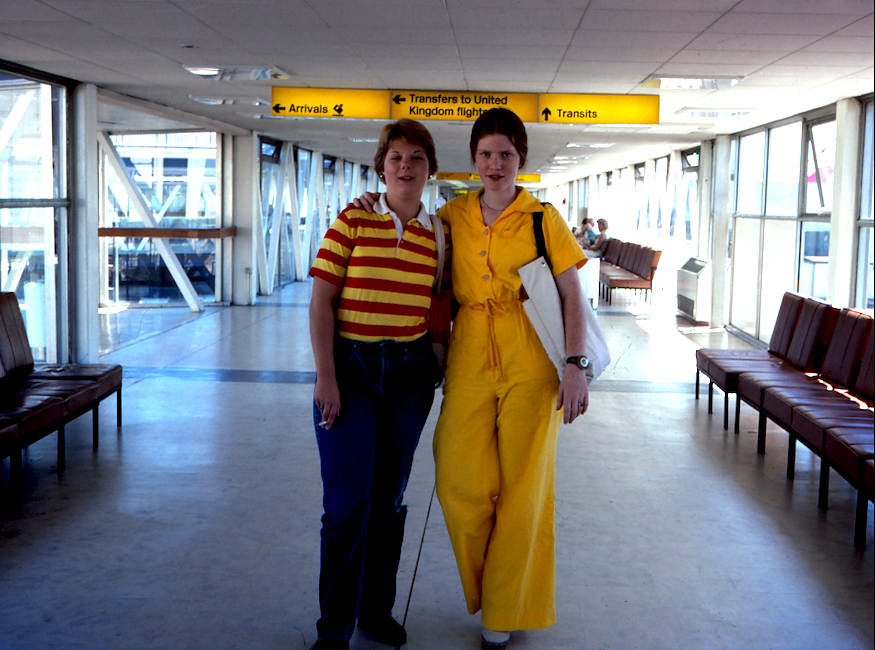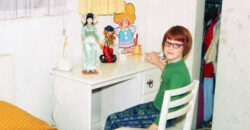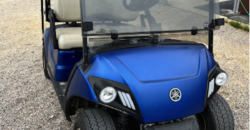Send It Via Airmail

I was 16, going on my first plane ride ever, to a country I had never heard of, to live with a family I had never met and attend a school whose name I couldn’t pronounce, but it never occurred to me I should be anxious. Even when we sat on the runway at JFK in the largest plane I had ever seen (the ONLY plane I had ever seen the inside of), I was excited, not scared. Even when lightning struck the plane before we could take off, sending us back to the gate for a 24-hour wait in the airport, I just saw it as an adventure with 20 other exchange students I had never met.
I wore a yellow jumpsuit (that looked a lot like Big Bird in retrospect), not realizing every bathroom visit would be a full-on stripdown. My long orange hair, thick and parted in the middle, was in a low ponytail with a piece of white yarn tied around it to cover the rubber band. I talked with a broad Southern drawl. Some of the other kids were from big cities and older-looking. Some of them even smoked. They begged me to say things; I didn’t realize they were making fun of me.
I called home collect from a payphone in the terminal. My mother, always prone to disaster scenarios, screamed: “HAVE YOU BEEN HIJACKED?” while my father tried to calm her down. I made the mistake of telling her the plane was hit by lightning, and Daddy had to wrestle the phone from her at that point because she was hysterical. “We’re fine, Daddy. Nobody got hurt. We have to wait for another plane to take us to India tomorrow, and then wait a few days for the next one to Sri Lanka.”
It was soon clear we would spend the U.S. Bicentennial at an airport hotel in New Delhi. The staff tried to make it special for us with red and blue jello. We waved little American flags made in China, and that was that.
When we finally landed in Colombo, there was no time for language classes. Instead, we deplaned into the waiting arms of strangers, Tamil and Sinhalese families, who had come to the airport to take us home. In an instant, our group disbanded, taken to towns across the country without knowing a word of the language.
My host family lived in a tiny village where the villagers were surprised I didn’t wear makeup because all the girls did in the American movies they had seen in Colombo, a 45-minute bus ride away. They were fascinated that I was left-handed since the left hand is used to clean oneself in the bathroom, toilet paper being nonexistent. They asked if my freckles hurt.
One month, another exchange student invited me down the coast to their village for a Sinhalese wedding ceremony. I took the train alone in a car full of deep brown sailors wearing crisp white uniforms; soon, we would be singing the theme song to Gilligan’s Island together as palm trees passed by the train windows.
Once there, I swam in the rice paddy with my friend. In the evenings, I lay on my coconut husk bed listening to the men outside my window get drunk on moonshine arrack and start singing, “Muhammad, Muhammad Ali, floats like a butterfly, stings like a bee,” for most of the night. The wedding rituals were beautiful and elaborate and hard to understand. There was more Muhammad Ali every night. On the fourth day, I boarded a train for home.
When the train arrived in Colombo, my right foot was swollen three times its size, and I couldn’t place any weight on it without excruciating pain. I sat on the ground, waiting for my bus to Pita Kotte. A young man helped me on, carrying my bag for me. When I arrived in my village, it was dark. I was a half-mile from our house, down a mud lane, and I crawled there, leaving my bag behind. Every movement caused a sharp burst of searing pain. I had seen pictures of elephantitus in National Geographic magazine and diagnosed myself as I crawled.
My host family took one look at me and started the trip back to Colombo by bus to see a doctor, the young male cousins carrying me. We entered a dirty urgent care building, and the doctor spoke quickly to my host brother, who yelled back at him. I sat between them in horrific pain and stunned silence, dirty and tear-stained. Finally, my host brother, who spoke some English, informed me the doctor wanted to amputate. Instead, thankfully, they carried me back home.
I wrote my friend Jodi back home about the amputation suggestion; her mother called my mother and read her the letter. Mail was slow from Sri Lanka, so by the time Mama heard about it, a doctor had been found to prescribe antibiotics, and my foot, infected with a parasite in the rice paddy where I swam during the wedding weekend, was mostly healed. But Mama didn’t know that. No doubt she needed a prescription of her own after that.
There were no telephones in my village. To take an overseas call, I had to go to the main post office in Colombo and wait all day to be summoned into a small wooden cubicle. So I went, and I waited. Daddy had the presence of mind to send Mama off to church that Sunday morning, so he and I could calmly discuss my foot and the lack of toilet paper. A big box arrived two weeks later with Kool-Aid mix and toilet paper. He had paid $48 to send it via airmail–that would be $257 in today’s money. He would have to give 22 haircuts to pay for that, at 2.25 a pop. The postmaster said, “Now Melvin, do you really want to pay that much to send toilet paper around the world?” I’m sure Daddy didn’t have $48 to spend like that, but he did anyway.









